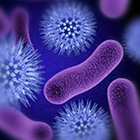 I recently watched a talk by Dr. Bonnie Bassler concerning how bacteria communicate with each other (“Discovering Bacteria’s Amazing Communication System“) on TED.com. I came away from her talk with a new understanding of who we are and how we are influenced by bacteria.
I recently watched a talk by Dr. Bonnie Bassler concerning how bacteria communicate with each other (“Discovering Bacteria’s Amazing Communication System“) on TED.com. I came away from her talk with a new understanding of who we are and how we are influenced by bacteria.
Dr. Bassler made a major point early in her presentation: while we have one trillion cells in our body, the number of bacteria living on and in us at any moment is about 10 trillion! Also, the amount of genetic material these bacteria contain is about 99 times the genetic material in our own bodies. Fortunately, most of these bacteria actually protect and support us!
Dr. Bassler explains that these bacteria possess a sophisticated communication system using a kind of hormone language to communicate both in intraspecies and interspecies ways. She shows how—using this hormone language—a single species exhibit a group behavior when the numbers of that species reach a certain threshold. This group behavior, for example, could either protect us (the host) or be a virulent attack against us.
In her research, Dr. Bassler learned how to make chemical variants of this bacterial hormone language that could, for example, confuse the bacterial group and prevent it from taking action that would harm humans. She thinks this could be the basis for safe forms of antibiotics in the future.
One thing is clear from Dr. Bassler’s work: we want to encourage the good populations of bacteria that protect us and discourage populations that could harm us in larger numbers. This brings us to the topic of prebiotics and probiotics. Bassler’s research supports the practice of providing nutritional substances upon which the “good” bacteria thrive, or actually supplementing with large amounts of beneficial bacteria themselves.
While the topic of using prebiotics and probiotics for improving health is hardly new, this new research offers excellent logic for implementing such an approach. In fact, her research confirms the need for doing so! (Also, read our three-part blog post “Exploring the Inner Ecosystem: A PolyDophilus Primer”.)
More recently, Science magazine (June 8–12, 2012) devoted its weekly issue to gut microbiota, highlighting the significant amount of research on this subject in recent years. This research indicates our gut bacteria are a major factor in determining our overall state of health. These bacteria can determine our mental state, the health of our immune system, tendencies for weight gain, etc. In addition, the bacteria provide significant nutritional factors to our body, thereby keeping us healthy.
I am tracking developments in this important area of research. There will surely be many new insights for actions we can take to improve and maintain our health. Stay tuned!


2 comments